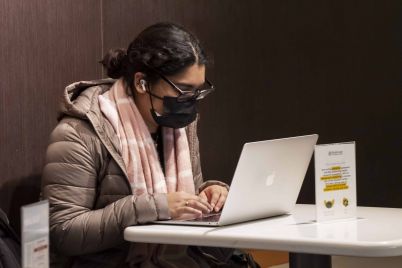
WCC instructor Nathan Oliver demonstrates welding during Free College Day Sept. 30. Photo by Jennifer F. Sansbury
By Lilly Kujawski
Editor
This February will mark the return of the second annual Career and Technical Education Month, which is a national awareness campaign that aims to celebrate occupational students and programs.
CTE Month will begin on Feb. 4 at the Student Center with a kickoff event, which will include food, fun, giveaways, music and a photobooth, according to Anthony Webster, a student success specialist who works to support CTE students.
The event seeks to engage all students, not just those in CTE programs, Webster said.
So, what exactly are CTE programs? According to Webster, the terms “CTE” and “occupational” are used interchangeably and programs in the occupational fields also fit in the CTE category.
Many programs offered at WCC fall under the CTE umbrella, but according to Webster, there are a large number of students in those programs who have no idea they are CTE.
“It’s really an effort to celebrate career and technical education students, their accomplishments and increase awareness and exposure of programs, opportunities and career paths,” said Webster. “That way, students are aware of what kind of jobs are available to them after they graduate.”
“It’s always a reassuring, eye-opening experience when you meet a student who is welding, perhaps, which is one of our programs, and you say ‘hey, did you know your program is CTE?’ and they say ‘oh no, I didn’t know that’,” Webster said. “And it means something.”
“They really haven’t grasped the bigger picture of it all. So, really we’re helping them understand, that hey, you’re going to graduate making tons of money with a skill that no one can take from you,” Webster said.
“It’s a month of learning exposure for the entire campus and the community,” he said.
There are degrees and certificates available in 101 programs that are considered to be CTE at WCC, according to the WCC website.
“The bigger areas are business, computers, and a lot of things you do with your hands like automotive, welding and HVAC, and some arts,” said Apryl Scheffler, a retention and completion specialist at the college.
According to Scheffler, many students are drawn to these programs because of an abundance of job opportunities in those fields.
“These are considered high-skill, high-demand, high-wage jobs,” Scheffler said. “I think that’s a big draw for students, the assurance of employment.”
According to Webster, many non-traditional students are finding an appeal in CTE fields. A few examples of non-traditional students include student parents, low-income students, students with disabilities and students enrolled in a program considered non-traditional for their gender, such as women in cybersecurity and automotive services and men in nursing, to name a few.
“Anything that will spike those students’ success here at the college, we try to do our best to make sure that they have it,” Webster said.
Funding from sources like the Carl Perkins grant at WCC is available, which provides these non-traditional students with the resources they need, including tuition assistance, books and supplies, childcare and access to transportation, Webster said.
“Not every student wants to go to a four-year school and get a four-year, traditional degree, some students want to go and get their hands dirty and get a degree in how to fix cars,” Webster said. “There needs to be just as much money that’s allocated for that student who wants to be a doctor, for that student who wants to be a mechanic.”
“So, it’s important for students to know that they are underneath these CTE programs, so they know what resources are available to them,” Scheffler said.
Scheffler and Webster hope to reach beyond WCC’s main campus, too. They are working with Bonnie Truhn, manager of adult transitions at WCC, the staff at the Harriet Center in Ypsilanti, an extension of WCC, and the Michigan Works! staff to connect students of the Harriet Center with CTE opportunities at WCC.
“After the month of February, hopefully there’s no stone unturned and no student on campus who doesn’t know that they’re a CTE student,” Webster said.


